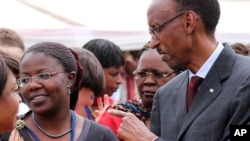KIGALI —
Rwandans once again voted in a female majority parliament in last week’s elections, directly electing 26 women in addition to the 24 seats reserved for females in the constitution. Rwanda has come to be the world’s leader in women lawmakers.
Women hold an unprecedented 64 percent of seats in Rwanda’s parliament, more than any another country in the world.
Connie Bwiza Sekemana has been a Member of Parliament since 2003 - elected in the first legislative vote held after the genocide.
“The issue is not the sex. It is the issue of equal opportunity, of citizen’s rights, human rights, the fundamentals of any citizen. Who is who that brings what? It does not matter whether it is a woman or a man. It matters on performance and delivery,” she said.
With a female majority in the legislature, Rwanda now is seeing more laws aimed at empowering women throughout the country. Sekemana and her peers collaborate across party lines in a Forum of Women Parliamentarians.
Last year, parliament amended a law to legalize abortion in cases of rape, incest, or to protect the mother’s health. Sekemana said the newly elected parliament will continue the focus on equality issues.
“Among other issues, gender violence, gender imbalance, all of these will be taken to account. This is all a positive part of it,” she said.
National University of Rwanda lecturer Christopher Kayumba has published a book on women in Rwanda’s parliament. He said the gender ratio speaks to the evolution of politics in Rwanda.
“The old narrative was ethnicity. Hutu-Tutsi politics. So the gender discourse can help shift the discourse away from the ethnic,” he said.
Kayumba said while women are very electable in today’s Rwanda, beyond the quotas, there has been a concerted political effort to promote women in politics.
“Parties decide who goes on [the] party list of candidates, and in which order. So if political party leaders can decide to put women in winnable positions, it also says something about nature of political parties and leaders," he said.
The Rwandan government, led by the Rwandan Patriotic Front [RPF], has prioritized women’s representation, adopting a constitution in 2003 requiring women to be granted 30 percent of posts in all “decision-making organs.”
Women played a significant role in the early days of the RPF, born of the guerilla army that brought an end to the genocide in 1994. A group of RPF women fighters formed in exile in Uganda; some of its leaders, Sekemana included, now occupy seats in parliament.
The gender ratio in parliament reflects that of the greater population. The genocide dramatically changed Rwanda’s demographics. More men were killed during the violence, and more men currently are in prison for genocide related crimes.
Women hold an unprecedented 64 percent of seats in Rwanda’s parliament, more than any another country in the world.
Connie Bwiza Sekemana has been a Member of Parliament since 2003 - elected in the first legislative vote held after the genocide.
“The issue is not the sex. It is the issue of equal opportunity, of citizen’s rights, human rights, the fundamentals of any citizen. Who is who that brings what? It does not matter whether it is a woman or a man. It matters on performance and delivery,” she said.
With a female majority in the legislature, Rwanda now is seeing more laws aimed at empowering women throughout the country. Sekemana and her peers collaborate across party lines in a Forum of Women Parliamentarians.
Last year, parliament amended a law to legalize abortion in cases of rape, incest, or to protect the mother’s health. Sekemana said the newly elected parliament will continue the focus on equality issues.
“Among other issues, gender violence, gender imbalance, all of these will be taken to account. This is all a positive part of it,” she said.
National University of Rwanda lecturer Christopher Kayumba has published a book on women in Rwanda’s parliament. He said the gender ratio speaks to the evolution of politics in Rwanda.
“The old narrative was ethnicity. Hutu-Tutsi politics. So the gender discourse can help shift the discourse away from the ethnic,” he said.
Kayumba said while women are very electable in today’s Rwanda, beyond the quotas, there has been a concerted political effort to promote women in politics.
“Parties decide who goes on [the] party list of candidates, and in which order. So if political party leaders can decide to put women in winnable positions, it also says something about nature of political parties and leaders," he said.
The Rwandan government, led by the Rwandan Patriotic Front [RPF], has prioritized women’s representation, adopting a constitution in 2003 requiring women to be granted 30 percent of posts in all “decision-making organs.”
Women played a significant role in the early days of the RPF, born of the guerilla army that brought an end to the genocide in 1994. A group of RPF women fighters formed in exile in Uganda; some of its leaders, Sekemana included, now occupy seats in parliament.
The gender ratio in parliament reflects that of the greater population. The genocide dramatically changed Rwanda’s demographics. More men were killed during the violence, and more men currently are in prison for genocide related crimes.




